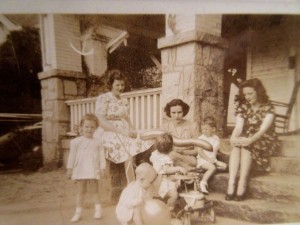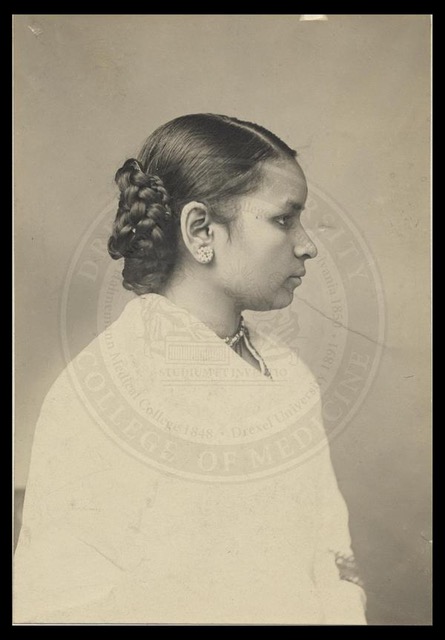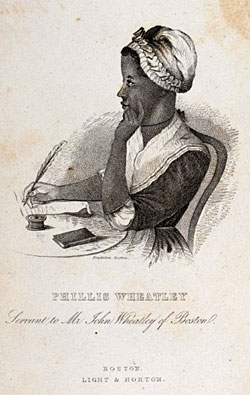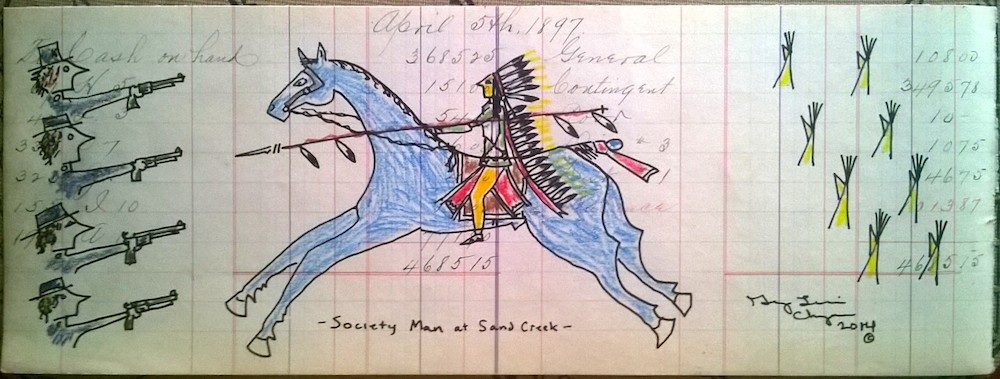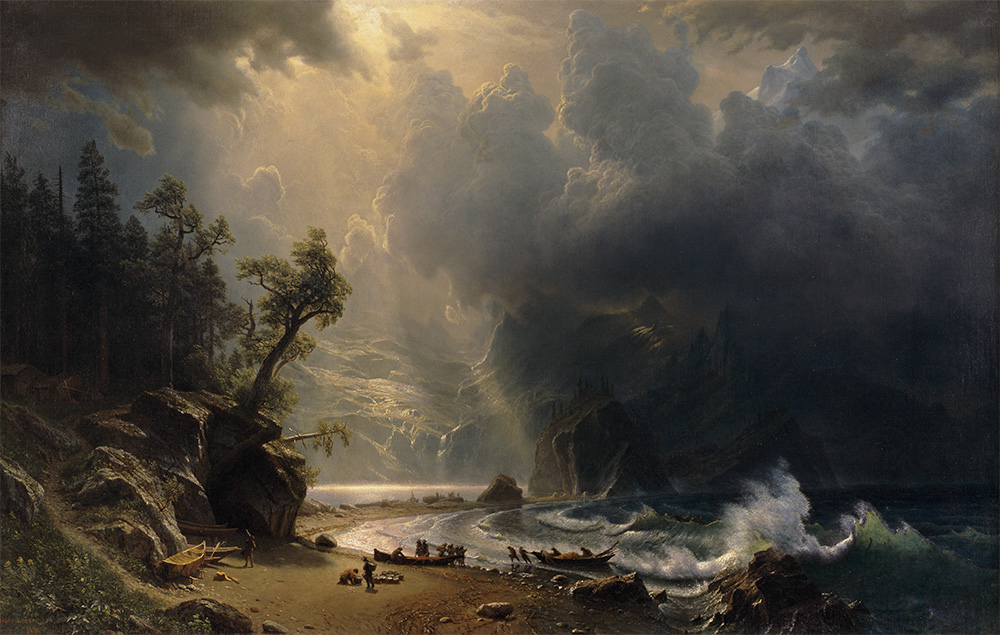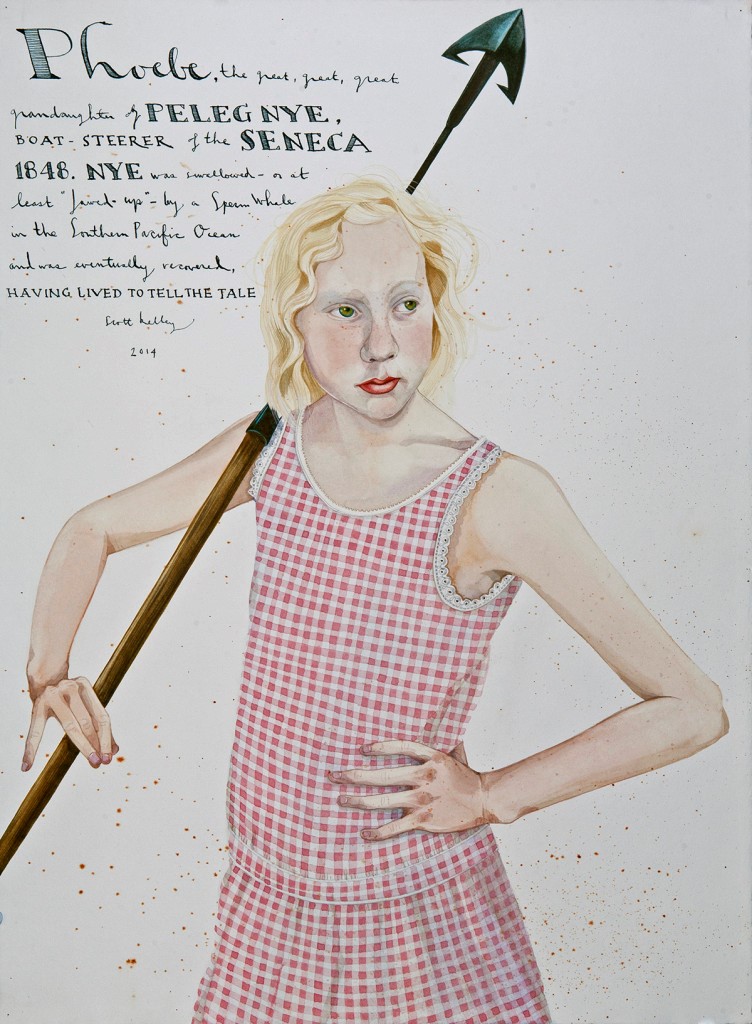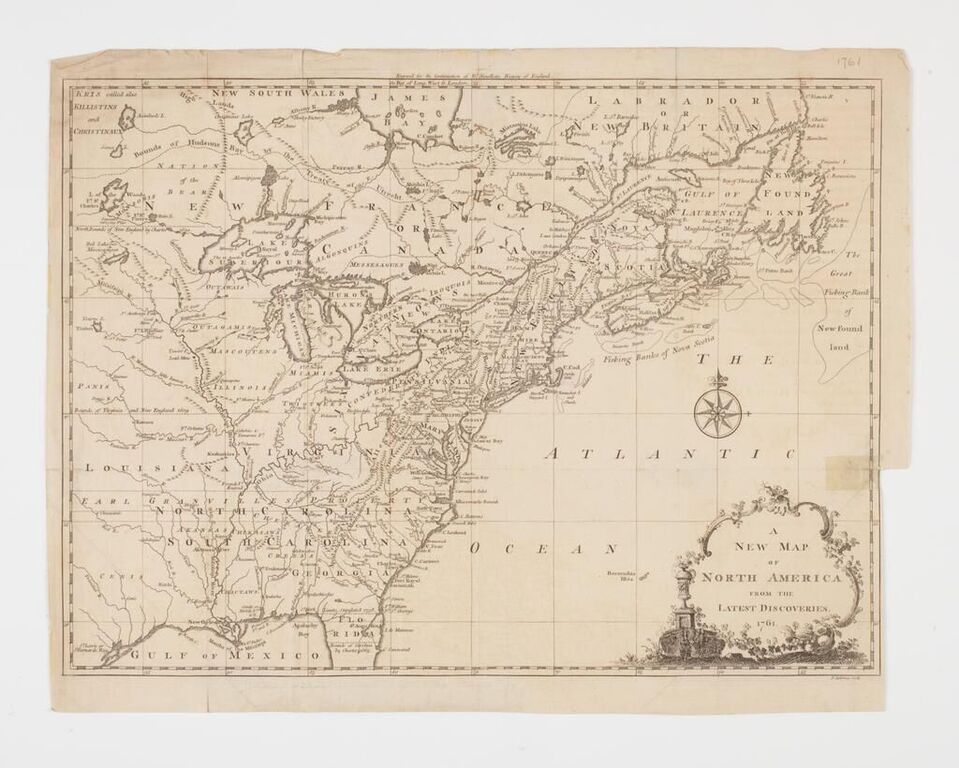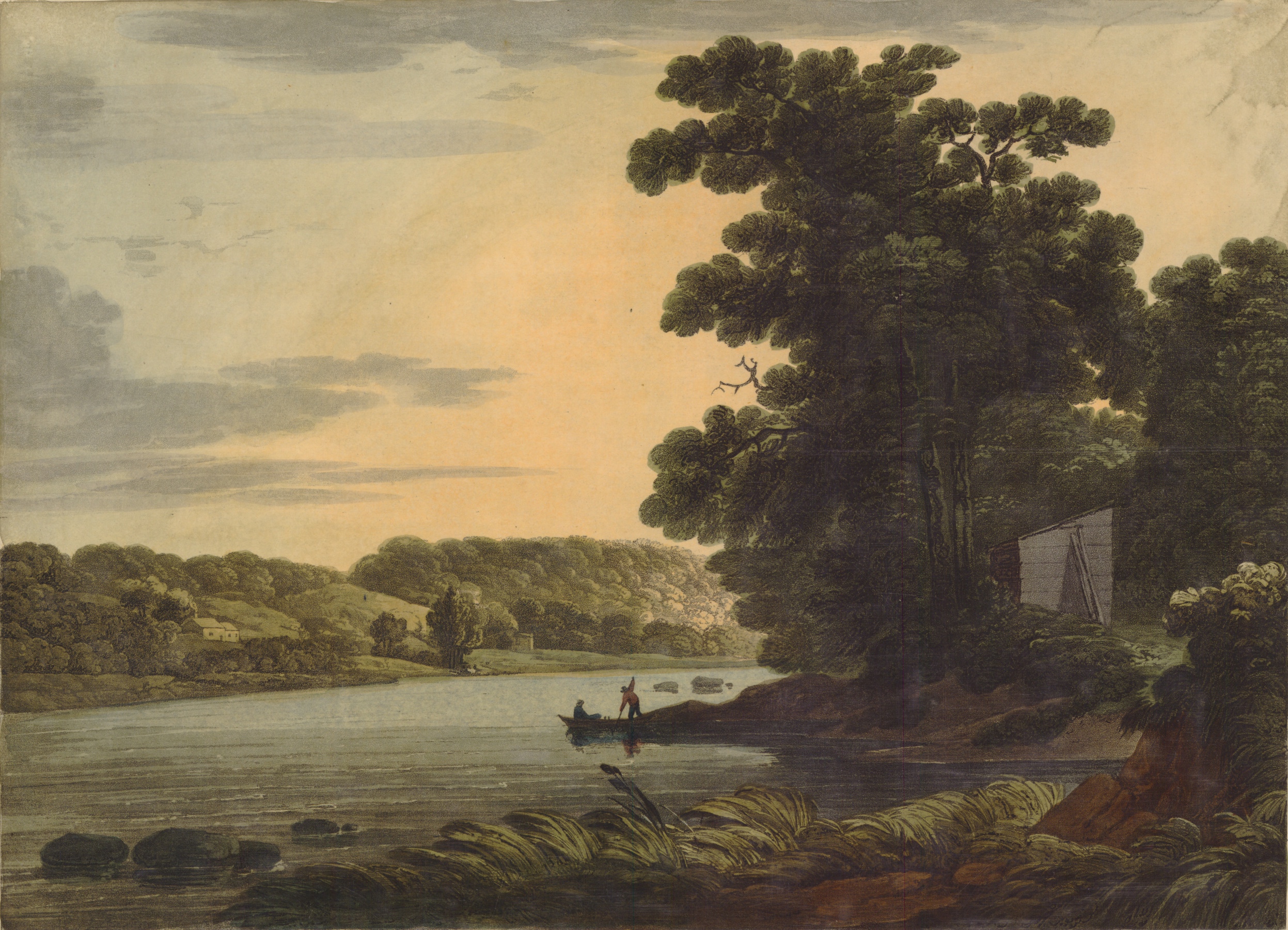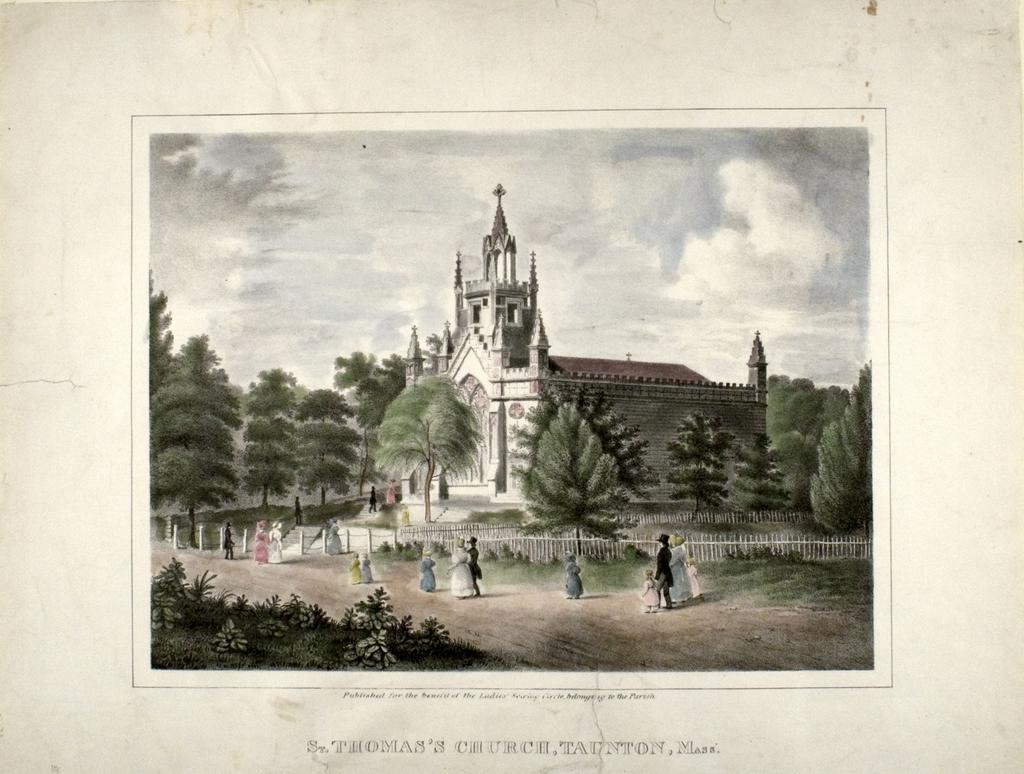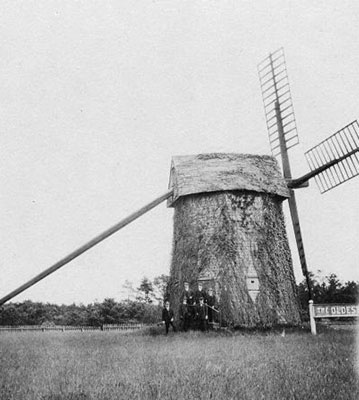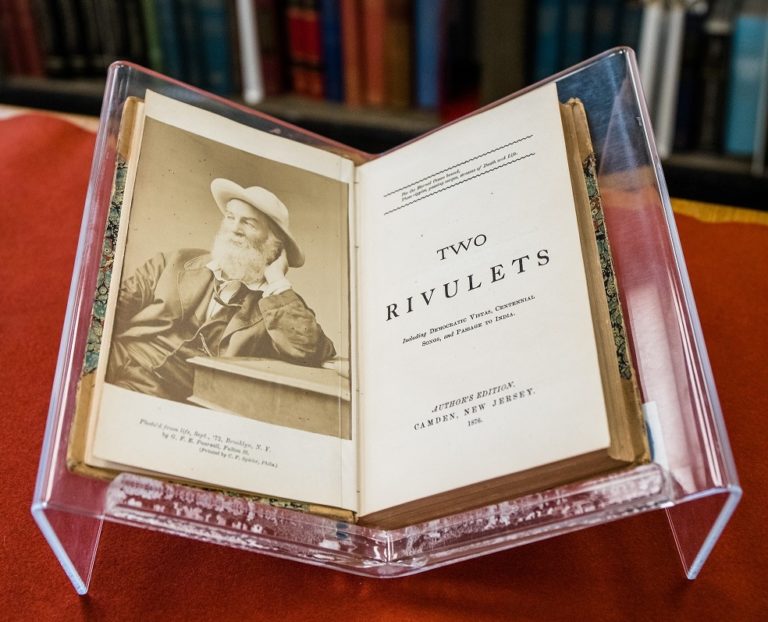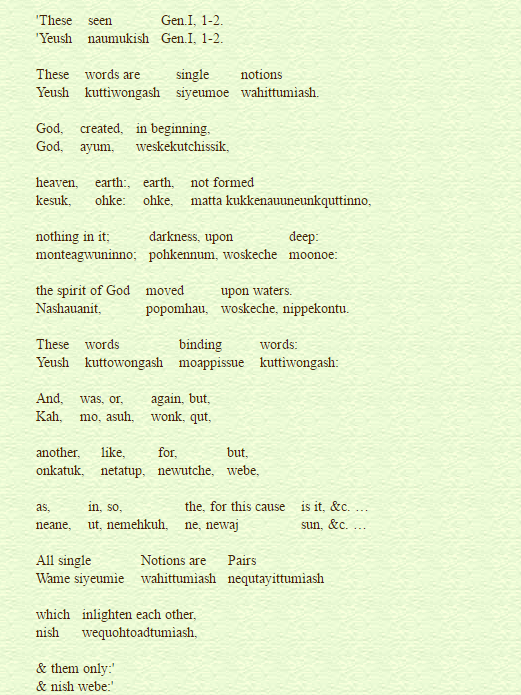1.
If ever there were the Work
of Grace wrought savingly
in my heart; the Time
when, the Place where, the manner how,
was never apparent.
I could not so find as others did
Terrors and Affliction.
It caused in me much Sadness.
Verily to Believe
that there was no Work of Grace,
this I could not do: for it was God
put it into my Heart
to Live abroad; and it was God
that made my Father willing.
God by his Providence
brought me near Mr. Warham
and knit my Heart unto him.
So God brought me out
of Plymouth the 20th of March
in the Year 1629,30, I being
then about the Age
of Twenty one Years.
Blessed be God that brought me Here!
—Yet how
to be in some measure assured?
2.
As a boy I had a Love
to see others Play.
On a Time when I was standing by
on the Lord’s-Day,
one Foot in the Temple
of the Law, one out, watching,
some Youths gave me Points
which they played for, to hold
until their Game was out.
Then God did cause my Conscience
to be out of quiet, and brought to Mind
how Saul stood by and kept the Garments
of them that slew Stephen.
But I did not put down
that which I had in keeping;
no, but turned my Back on God
and stood with Cherry Petals
falling in my hair,
and waited for those Boys
to acknowledge me,
so desperate was I
to serve a Purpose.
When they did not,
forgetting me as thoughtlessly
as they had plucked me from the Flock,
it was as though my Stomick
were that folded away
Accompt a Merchant pens—Aye,
even that very One we kept
for powder and Corn and Frost-fish
the first winter in our Tent—
only now the Columns
had fallen, the Points
bleeding one into the other. Only then
did Betrayal find me contrite.
3.
Consider the Tower
at Castle-Island, at the entrance
of this Port God granted
for our safekeeping:
made first of Mud-Walls,
then Pine Trees, Brick,
until finally
it Housed Family, Souldiers,
and, trained
on the Horizon,
the six good Saker Guns,
which nevertheless snatched from this
World my son, Supply,
in his Flower and Prime.
When the Body of Death presseth down,
we must watch without Surcease
those same Shoals, over which
God transplanted us—
without Surcease,
watching the Fishing Roads
for foreign Sails
or Storms shrouding the Islands
in green Wrath,
watching the tide
for Signs of the Despot’s
Rise and Fall, for Signs
of Persecution and Salvation.
The heart is ever in danger
of growing dull or lulled in the Duty,
like Moses his Hands
when they were lift up against Amalek.
Drop them but a little,
and the Horde rallies and gains,
and this, our Promised Land,
is in the Balance.
4.
I remember how, after Capt. Squeb
turned us ashore,
and left us to shift for our Selves
in this Indian Wilderness,
in that December,
which took half our Number,
I remember how, a mile in,
battered by Ice and Wind,
the River Charles narrowed
to a choked Braid.
We found some Wigwams
with some Store of Corn,
and one blasted House,
and in the House there was a Man
which had a boiled Bass
that did gleam with Promise.
So we sent back for the Governour
and his Assistants.
Yea, a little constant Stream
of godly Sorrow,
is better than a great Land Flood,
tho’ the Flood maketh the greatest Noise.
5.
In the dream I shoot Supply.
I have convinced him that it must be.
And so, like Isaac, he complies.
Twice I load, twice fire.
The second time at closer range.
How could I?
No wounds show through,
though we both of us know
he’ll be dead soon,
though we agree
it must be worse at closer Range.
He coughs up Lead.
It falls like Ryce from his coat.
He forgives me.
Back aboard the Blessed
Mary and John, which brought me Here,
on the Captain’s table, on a Chart
of the Atlantic, I let fall
a Handful of the Shot,
which scatters and arranges like a Fleet
of Sand-crabs I watched disembody once
as a Boy, as we rise and plunge
and the Good Ship
is handed down the waves.
6.
The Question to my Soul
was this (pitching upon that Sin
which I did confess my natural
Corruption most inclined me to)
the Question, I say,
which by God’s help, I put
to my very Heart and Soul
was Whether if God would assure me
that I should be saved,
although I should commit such a Sin,
would I commit it?
Satisfied—the word
pales, but I have no better—that I would not,
I felt as though (I do believe)
God’s Holy Spirit did witness
I was His Child,
and it did so transport me
as to make me cry out
upon my bed,
He is come, He is come!—
and to make, as I imagine,
the top Room of the Castle glow
with the startled Eyes of Tapers
struck at my Alarum,
at my Ecstatick fit,
shining down the Waters.
And I felt as I were back
in Devonshire,
when, first inclined
unto the Revd. Mr. John Warham,
I Covenanted with him,
and I had never
so much as heard of New-England.
Appeared originally in Western Humanities Review.
Statement of Poetic Research
This is fore-runner of my after-clap
—Anne Bradstreet, “A Dialogue between Old England and New”
When I was about twenty, my mother’s first cousin gave me a copy of the memoirs of our distant Puritan ancestor, Roger Clap. “You’re the family writer,” cousin George said, bequeathing me the legal size Xeroxed pages. I didn’t read it, of course, but by some inchoate sense of duty I kept it, eventually on the lower shelf of a wooden cabinet, one of several antiques I’d inherit—and inevitably scratch, stain, and break—after my mother’s death. She’d only recently inherited the furniture herself. I remember the dark-stained turn-of-the-century wingback chairs, dining room and side tables overwhelming her and her apartment. Likewise for me, the local sibling shouldered with all that stuff, the furniture became a kind of penance. My begrudging care/negligence of it rehearsed the bitterness and guilt of losing her.
There was more than just physical weight to such family “baggage.” Like the musty boxes of china that came with the haul, it must have been a constant reminder to my mother of growing up in Atlanta in the 1940s and ’50s—high-society Atlanta. While her father’s family had been wealthy (my grandfather grew up in a mansion on Peachtree Street), her mother’s family, the Clapps, had prominent roots going back to the early industrializing of Georgia, not long after the removal of the Creeks.
But the Clapp legacy was colonial as well as Confederate. Long before Julius Rowe Clapp—carpenter, cotton miller, and eventual owner of “Clapp’s Mill” in Columbus—moved south in the 1830s, our branch of Clapps had been in Massachusetts—Dorchester, and then western Mass.—for eight generations, beginning with Roger in 1630. My great-grandfather, Brainard Clapp, was the last male Clapp in our line; he had two daughters, my grandmother, Sue, and my great aunt, Mimi (which makes me an “after-clap”). My information about their lives in Atlanta is sadly scant. Brainard, an Atlanta insurance man, died in a car crash and left a big house on “the Prado,” where “Big Mamma” Gertrude lived out her days. I suspect the Depression undercut any other inheritance. Sue and Mimi’s marriages proved destabilizing, to say the least. By the time my mother came along in the 1940s, the blue-blood class-prestige was a hard act to keep up. Sue and Mimi moved in together for a time, with five kids between them, my mother the oldest and cousin George the baby. I know Sue and Mimi did some seamstress work for income. Still, there was the name, about which the “old south” culture of Atlanta was making its last hurrah to care; there were the generations of passed-down stuff—the furniture and wedding silver; there was the lilting accent. As my grandfather lost job after job, and left and returned with his tail between his legs, my grandmother made the clothes and scrapped up exquisite meals, entertaining to great acclaim. As the oldest child, my mother helped shoulder the burden of the illusion. No wonder one of her biggest insecurities thereafter was feeling “like a fake.” Growing up, we weren’t close with extended family. In some ways that void gets filled by my historical and creative curiosity about them. Just after graduating from college in Atlanta, I started waking up to my mother’s family’s history there. The sense of class and family importance, of expectation, disappointment, and sacrifice had all the markings of a good story—or so I thought. A rich source of tension in the narrative, but then of resistance within the family when I came seeking details, was propriety. But the ancient past, emotionally indifferent, cool to the touch, idealized: that we can all get behind.
I realize this sounds a little cliché, like a watered-down version—a generation late—of Blanche’s class-warped delusions in A Streetcar Named Desire. Lugging the furniture from house to house and city to city over the years, there’s been no little lamenting among friends, partners, and me—in a played-up Shelby Foote accent—over the loss of “the better sort of people,” or the regrettable changes “ever since that damn war.”
Appropriately enough, I kept Roger Clap’s memoir stacked in the cabinet with a copy of my mother’s Colonial Dames of America papers. Including faded copies of scrawled nineteenth-century family Bible lineages, as well as some faded copies of family letters, these papers tell us that Roger was born in Salcombe Regis, Devonshire, England on “6 April A.D. 1609.” He had two sisters and was the youngest of five brothers (he would convince many of them to migrate after him). As a teenager, he got swept up in Puritan preaching in and around Exeter, or “Exon,” as he calls it (short for Exoniensis, Latin for “of Exeter”), which was the nearest city, twelve miles west. His mother was dead and he and three other brothers (presumably the youngest) were living at home, in no doubt cramped quarters. It must have seemed extra-cramped in the coastal lowlands, busy not only with iconoclasts but also adventuring sailors and fishermen, who had a lock on New England trade and fishing.
Judging from Google maps, Salcombe Regis even now is a single crossroads a few thousand feet off the Devon coast, “bleak and desolate in the fall and winter,” according to Bernard Bailyn. A deep combe runs the distance south from town to the bitten, chalky cliff, much of which, no doubt, has been eaten away since Roger’s childhood. It makes me think of Edward Thomas’s “The Combe”:
The Combe was ever dark, ancient and dark.
Its mouth is stopped with bramble, thorn, and briar;
And no one scrambles over the sliding chalk
By beech and yew and perishing juniper
Down the half precipices of its sides, with roots
And rabbit holes for steps. The sun of Winter,
The moon of Summer, and all the singing birds
Except the missel-thrush that loves juniper,
Are quite shut out. But far more ancient and dark
The Combe looks since they killed the badger there,
Dug him out and gave him to the hounds,
That most ancient Briton of English beasts.
But to return to the papers: Roger “was a resident of Massachusetts and died in Boston, Massachusetts on 2 February A.D. 1691.” His “services upon which [the] claim of eligibility to membership is based are as follows: Lieutenant of Ancient and Honourable Artillery Company, 1655.” This company is the oldest chartered military organization in North America.
In the pages following, bracketed generations reach back in time, starting with my mother, Sue (everyone called her Su-Su). After Julius Rowe Clapp and Eleanor Milton Howard (married in Columbus in 1839), the place of doings switches from Georgia to Massachusetts and the names start to take on an unmistakable Puritan flavor: Winthrop, Preserved, Mehitable. In his preface to the first edition of Roger’s Memoirs (1731), the Rev. Thomas Prince of the Old South Church in Boston writes that Roger “was desirous that God should have the Glory of his Providence, in bringing Him with so many pious People into this hideous Land, in preserving & supplying them, increasing, prospering, and working wonderful Salvation for them.” In this typical depiction of the Puritan experiment, Prince manages to cover at least three early Clap(p) verb-names, tellingly colonial: Preserve, Supply, Increase.
So there was Roger in his Clapp arc, waiting.
I was on the lookout for raw material while doing my PhD in creative writing and literature at the University of Missouri. A teacher liked a poem I’d written about President Truman and wondered if I had more “political” poems. Well, I thought, there is this memoir. I’d never known what to make of Roger’s zealotry, of which one got an unadulterated whiff just glancing at the memoirs. I was inclined to agree with the nineteenth-century Clapp family historian, Ebenezer Clapp, who, complaining 200 years after Roger’s testimony, writes, “[w]e would gladly exchange the well-filled pages of wholesome religious instruction, written by Mr. Clap for the benefit of his posterity, for an equal quantity of historical facts which his opportunities doubtless might have enabled him to record.” As with many an old text, what we call “unique details” tend to be swallowed up in generalization; personal experience and feeling in Providence. We want to know more about the Indians, the way the landscape looked, how he courted his wife, his idiosyncrasies, what, or if, he read. With a BA in classics, I’d cut my teeth on old stuff—primary texts. And like any good poetry student trained in the post-Eliot, post-New Critical English tradition, I had a taste for the “sweete” tones and idioms of seventeenth-century English and the KJV. Still, it takes time (I can’t help but think of all the Wait, Waitstill, and Patience Clapps—named because their fathers thought they’d outlive the Anti-Christ!) to make our way through the dusty annals, for a mature interest to engross us. Once I fought my way into the text (snapping my chinstrap and lowering my head), I was seduced by the sheer, sublime sense of history. As Rev. Prince writes, Roger was “an Eye-witness,” and “by the publick and continued Esteem his Country paid him in his Day, his Testimony comes with Power upon us.” At back of the primacy of the account was the legacy of the experiment, of the commonwealth, “the effects of which”—as Ebenezer writes in 1876 and Jim Sleeper has recently echoed in The Atlantic (both following the indubitable de Tocqueville)—“will be felt throughout time.” One of 140 emigrants from the West Country, Roger came over on the 400-ton Mary and John, the first ship in a big wave of Massachusetts Bay Colony ships, the biggest wave the new world had seen. When the ship captain landed at Nantasket and refused to navigate the perilous flats and shoals among the islands of Boston harbor, Roger, at twenty-one years of age, was one of about ten “able-bodied” men to venture forth on behalf of the Colony in a boat borrowed from “an old planter.” Braving the wilds and reconnoitering the proto-settlements of Boston, Cambridge, and Watertown, the expedition was led by a “Low Country Souldier, one Mr. Southcot, a brave Souldier.” Southcot was one of many tough spiritual and martial father-figures for Roger, who would never see his father again. “Grizzled” Lowcountry veterans, as Bailyn explains, were the go-to English captains for—to quote Elizabeth Bishop—“penetrating the interior.” This might have been Roger’s entrance into soldiering. In a rare instance of speaking of the exceptionality of his experience, Roger offers, “I my self was one of the Centinals that first night.” Eventually, the party was recalled for the sake of the famished cattle, which, after great pains, were conveyed to Mattapan to pasture, selling the magistrates on the goodness of the place. In what became Dorchester, Roger joined the first church, immediately became a voting freeman, and over a long life served many tenures as deacon, town Selectman and Representative to the General Counsel in Boston, “commissioner to try and issue small causes,” military captain and Commander of the Castle, and authority to “join persons in marriage”; after 1663 “many persons were married by him.” He helped mete out policy for roads, bridges, and fences, the catechization of children, the containment of cattle, the killing of wolves, handling disputes, paying out wages, licensing town guests, setting fast days and days of humiliation and thanksgiving, setting up relief funds for the needy at home and abroad, acquiring and fixing church bells, punishing spiritualists and purveyors of lace… When the office of Captain of Castle Island—the “principal fortress in the province”—came open, the General Counsel chose Roger. The previous captain, Davenport, had died from a summer storm lightning strike while napping in his room at the castle. Providentially unpacking this tragedy, Roger notes that this was also the storm that blew the marauding De Ruither off course. He had been headed for Boston now that the English and Dutch were at it again.
Roger lived on the island—then a short ride from shore—for over twenty years. Ever the last redoubt of retreating forces, first glacial and then English, the island served at times as a prison as well as a strategic station for monitoring ship traffic. The main threats in the seventeenth century were the Dutch and French. Ships, which had to pass east of the island through the deep channel to get to Boston, were forced at gunpoint to “strike their colors.” Roger was constantly writing the General Court for promised provisions: “there is raines sometimes no dry plase to lodg in, wee have been forced to rise out of our beds many times the beds have been so wet with rain, and wee have no plase also to lay a bed in, but are forced to go from the little house to the Castle to bed in Dark rainy nights, and sometimes in snow above my wife’s knees…” It was said that he treated his garrison as part of his already large family, serving as Castle minister, there being no funding for another. It must have been an interesting household. When he took ill in his seventies, the town fasted for his recovery and celebrated with a thanksgiving when he was restored to health.
Just before the mostly bloodless Glorious Revolution and its minor counterpart in Boston, a very old Captain Clap quit his post in protest of the colony losing its charter and of the new governor Andros’s demands on his captaincy. Not unlike the Magna Carta, the colony charter came to be regarded as nearly sacred (another “covenant”). Through it, the colony, and conservative Dorchester in particular, retained enough independence from England to rule and prosper as they saw fit. Thus, as recorded in the Dorchester record book, a fast was held around 1680 in response to “the danger of losing our liberties, both civil and sacred.” Roger’s refusal—part-and-parcel with the town’s various acts of noncompliance following the accession of James II—can be seen as one of many preliminary steps, as Ebenezer puts it, “in that onward march of events which finally caused the separation of the colony from the mother country.” Roger removed with his wife to Boston. At his funeral in 1691, there was a grand procession, “the Military Officers going before the Corps; and next to the Relations, the Governour and the whole General Court following after; and the Guns firing at the Castle at the same time.”
Well, there was my “political” dimension.
In digging the text out of its contexts, one striking revelation for me has been how much less wild than advertised the “hideous wilderness” was. Europeans, in particular fishermen and traders from southwest England, had been exploiting the New England coast for decades, contributing to the spread of smallpox that decimated the coastal Indians in the 16-teens. The common claim that there was “no white person between them and the Pacific Ocean” is refuted by the presence of several helpful “old planters” in Roger’s memoir. Familiar with white faces, communicating by way of sign language and pidgin English, the Indians were also often helpful to the colonists.
And another thing: that “there could have been no inducement but one of principle to tempt them to choose a wilderness for their future homes” is questionable. Ebenezer’s already on the defensive here because as a historian he knows the first stirrings of the colony were tied up in fishery adventure, the Puritan’s great concern for his inward “Estate” bound up in his outward. As de Toqueville expounds (and as John Smith exploits in his advertisements for New England), opportunity was a factor for non-eldest sons like Roger. With four vying brothers under one roof, it’s no wonder he asked his father’s permission to go “abroad”—first to apprentice a few miles away, and later to New England. It doesn’t seem like he was counting on inheriting any significant piece of the pie, whatever pie there was. Roger’s own will, which I came across in Ebenzer’s Clapp Memorial: The Family in America, illustrates the situation, first by showing the huge amount of land that Roger accrued over his long life as a first-generation settler, and second, by showing how Samuel, his “eldest,” was “to have a dobble portion in all.” It’s possible that all the big Clapp migrations by non-eldest sons leading to my mother being born in Atlanta—to New England, western Massachusetts, and finally, to Georgia—were similarly motived. First Roger, then his son, Preserved, and a few generations later, Julius, all went “abroad,” braving the frontier. Starting out afresh, they prospered.
But tied up with the commonwealth of the New Jerusalem, Roger’s “inward Estate” was his animating concern, to a degree it’s hard to imagine any of his descendants meeting—at least from a historical perspective. I found myself drawn in his memoirs to the mysterious paraphernalia of the “relation” (the text, I would come to learn, is itself a kind of conversion narrative, not unlike Anne Bradstreet’s “To my Dear Children”). Without really knowing what a spiritual relation was, or how much rode on it, I started spinning a poem out of that voice of naked and embattled longing. If Roger was writing for the benefit of his “posterity,” wasn’t that me? Wasn’t he speaking to me, for me? It only seemed right, then, that I should speak for him, through him. Meanwhile, the conversion narrative as forerunner of heavenly translation, judgment, and church-state membership subsumed my doctoral research. The mask of my persona poem is surely not that of the historical Roger Clap, who would not be comfortable, I think, in a lyric poem. Perhaps the biggest difference is that my Roger is evidently not so entrenched in doctrinal squabbling: no blasting of Quakers, etc. I freely borrow and often alter—supplement and lineate—his phrasings, moving and splicing parts as I see fit. A few times I even put words from the various layers of eighteenth- and nineteenth-century commentary in his mouth. For emotional economy, I collapse several of young Roger’s Masters—Mr. Moissour and Rev. Warwick—into one object of affection, the Rev. Mr. John Warham. Although it has been mocked by at least one critic, one of the most touching parts of the memoirs for me is Roger’s confession of his boyhood pastime of no longer playing—but nevertheless keeping the points for naughty children playing—on the Sabbath. Whereas the historical Roger sees the Saul-like error of this complicity, my Roger, “desperate…to serve a purpose,” sins boldly, with “Cherry Petals / falling in [his] hair”—that is, until he realizes he’s been used. Only then does “Betrayal find [him] contrite.” I also fabricate the nevertheless fact-based dream sequence and ratchet up Roger’s conversion ecstasy to a dangerous level of enthusiasm. What did Warwick see in Roger that made that influential preacher—who, along with Warham, oversaw the first Dorchester church before Richard Mather took over—pay Roger’s father a visit and convince him to let Roger go to New England? Or, for that matter, what about Roger inspired the pious and rich Mr. Moissour to seemingly fund Roger’s voyage so that he wouldn’t have to start out as an indentured servant? Roger was not rich, well-connected, or university educated, so far as I can tell. What kind of apprenticing he had done is unknown. But he was young, seemingly robust, convicted, and willing—strong timber.
Do I sympathize with him? I’m compelled by his Puritan intensity, self-scrutiny, and doubt: a forbearance that I fancy carried right up through to my mother. I sympathize with anyone who cares that much, who dirties their hands in the messy negotiation of charity and stricture. It seems to me part of our “American grain.” An inveterate thinker, I celebrate the doers and decision-makers. With Roger, I got to create a strong, flawed, yet delicate father figure.
Growing up attending a Christian summer camp, I’ve always been fascinated by the idea of going off into the woods to found a community. Camp McDowell’s 100 percent majority consent “community meetings”—whether they should be mandatory or not was an issue—were in theory not unlike those early Dorchester meetings. Who doesn’t yearn for a new life, a new world? The economic and technological forces at work during the early modern period primed the pump: the upheaval, the sense of discovery. I especially relate as a writer. Just as words are my means for founding new worlds, Roger and his colony lived and died by words and the interpretation of the world through words, the Word, covenant upon covenant like a matryoshka doll.
As for the Puritans’ many shortcomings, I defer to Ebenezer: “In animadverting upon the acts of our ancestors, it is not to censure them as sinners above all others; on the contrary, they were far beyond their generation in all that exalts the human character. They were educated under the influence of many of the absurd superstitions of their age, and should not be condemned by the standard of our own. Those who so flippantly censure them as bigots, fanatics and persecutors, exhibit but little knowledge of the customs and prejudices of the generation by which they should be judged. This was probably the only land ever colonized, where conquest, plunder, gold or roguery, was not the moving cause. Although they whipped and banished, it was in a great measure to escape the contamination of the vicious and idle who invariably hover about all new settlements, and whose foothold here, they were early determined to prevent [such a one was I at summer camp!]. The great Christian doctrine of toleration, it must be remembered, had not been even dreamed of then, and they were the most tolerant of their generation.”
I don’t still have those long Xeroxed pages cousin George bequeathed me. In fact, I’m not sure I even used them to write my poem, as versions abound online. The original manuscript, passing from the Old South Church ministers to the Massachusetts Historical Society, was “irrecoverably lost.” A boon to Roger’s descendants as well as to advocates of conservative New England values, the memoir was printed three times in the eighteenth (1731, 1766, and 1774) and at least four in the nineteenth century (1807, 1824, 1843, 1854). There has been little modern scholarship on it or him. In her study of early New England conversion narratives, Patricia Caldwell notes the awkward, atypical nature of his late “relation.” In Puritan scholarship, he tends to be mentioned in passing, as if everyone already knows him. Ebenezer’s nineteenth-century histories are the best sources. Roger gets a page or two in William J. Reid’s Castle Island and Fort Independence (1995).
After these intervening fifteen years, I’m trying to get back in touch with cousin George. In the meantime, I’ve been e-mailing with his mother, my great-aunt Mimi. She reports from Atlanta that she’s ninety-four and in good health—and quite proficient with e-mail! She’s been snail-mailing me copies of family records; it’s nice to have a live family link for once. Keen to help with information about our storied past, she’s as silent as ever on the things I can’t learn from the Internet—about her past or current life in Atlanta, or how a family might reconcile both colonial and Confederate roots, or its low-church past with its high Anglican present. Was there a modicum of old northern sympathy?
I can see now that cousin George modeled himself on his great-great-grandfather, Julius, the southern Clapp progenitor, whose dashing portrait Mimi just mailed me a copy of, and which I remember seeing in George’s house fifteen years ago. The same visit yielded up a bill of sale for a Clapp’s Mill slave (obviously from before the mill was burned by Sherman and rebuilt by the Columbus engineer and former slave, Horace King). According to Julius’s 1876 obituary from The Columbus Enquirer, Julius, “from an humble starting point in life, by his own unaided energy and merit, rose to affluence and honour.” Not unlike Roger at the Castle, “[h]is office gave him control of a large number of persons [most of them girls and young women], who had to be disciplined and governed. These he ruled, and directed, not as an officer, but as a father whose word is law…” He also got religion in “the great revival which swept over Columbus in 1858.” We are assured that though “an undemonstrative Christian he had an experience.”
Cousin George followed suit business-wise, running a tile and stone company and coming to employ, among many others, my mother (which is how she ended up back in Atlanta). Starting with little but his wits and family pride, he’s done well enough to meet Julius’s gaze, I’d imagine.
Being only in touch with Mimi at this time, and only about ancient things, I can’t help but read her into Clarissa Rowe Clapp’s (b. 1808) undated letter from Montague, Mass., to her son, Julius, in Columbus.
My dear son,
Your long looked for letter was received few weeks since and thought I should have answered before this but Julia came to Montague soon after your letter came for a visit so mother accompanied her home to spend the winter as she was anxious to have me. I may say that kind and over ruling Providence has prolonged my unprofitable life till this time. My age is so far advanced I cannot nor ought not to expect to live in this world but short time longer. It matters not when we leave this world of sin and sorrow but it is of the greatest importance to be prepared to die in peace…[H]ow does Edward, Horace and Clara get along in their school? How is little Mary and Sewall? Tell them grandmother wants very much to see them. I hope little Sewall has recovered of his sickness when you last wrote. May this find you all in good health. Dear Julius how thoughtfull you are for your mother. It seems that I do not feel thankfull enough to God that given you so much of this worlds good and such kind heart to think of me at this time of cold winds and snow.
You wished to know if my change was getting low. I have enough for this winter. You wrote it has been very dry with you. There has been an abundance of rain here through the summer and fall; now pretty cold, some snow…give my love to Elinor…and all the children tell [them] not [to] forget grandma…
CR Clapp
Further Reading
Bernard Bailyn’s The Barbarous Years: The Peopling of British North America: The Conflict of Civilizations, 1600-1675 (New York, 2013) is a good source for the historical contexts of the Massachusetts Bay Colony. And of course, Patricia Caldwell’s The Puritan Conversion Narrative: The Beginnings of American Expression (Cambridge, 1985) is the gold standard on early New England conversion narratives. On Roger Clap, see Ebenezer Clapp’s History of Dorchester (Boston, 1859) and The Clapp Memorial: Record of the Clapp Family in America (Boston, 1876).
This article originally appeared in issue 16.2 (Winter, 2016).
Originally from Alabama, Austin Segrest teaches at Lawrence University in north-central Wisconsin. He got his PhD at Missouri, where he was poetry editor of The Missouri Review and studied Puritans, among other things. Find out more at austinsegrest.com.



